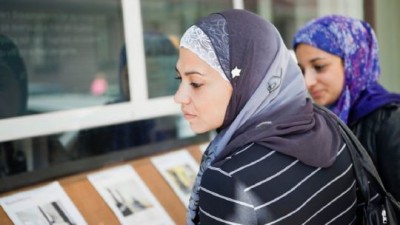Some managers at Norwegian social welfare agency NAV said they’re fed up with people who refuse work on the grounds of religion. The cases usually involve women who won’t take jobs which involve serving pork, selling beer or where they’re restricted by religious dress.

A NAV manager told newspaper Aftenposten it’s frustrating when women refuse jobs which don’t fit with their beliefs. The unnamed manager said women must be willing to wear uniforms, including trousers. “If they’re not willing to do that, how on earth will we get them into work? Is it okay that these families become stuck on social benefits? How much energy should we use on women who go to courses and training for 10 to 12 years without getting a job? When is it enough?”
Bjørn Gudbjørgsrud, NAV’s service director said refusing work on religious grounds is one of several issues around getting minority women into work. He said another is when employers discriminate against immigrant job seekers. “There should be very good reasons for not taking internships or jobs,” he said. “I think many would find it difficult to accept that you will not take a job in a canteen because they serve pork there. The majority would not accept that as a strong reason.”
Gudbjørgsrud believes it must be made clearer to immigrants upon arriving in Norway that those who can work are expected to do so. He said society must also reduce the structural barriers against immigrants and be more inclusive.
Most want to work
Anne Britt Djuve from research foundation Fafo has focused on immigrant and refugee relationships with the job market. She told Aftenposten that in her experience, most who come to Norway want to work. “But some, especially women, are not oriented towards paid work,” she said. “They have never been in paid work, they have no wish to work, and their family doesn’t want them to work either.”
Djuve questioned whether it was really religion the job seekers were concerned with, as many Muslims do work in jobs where they sell beer and pork. Djuve interviewed female participants and advisers in an introduction program for newly arrived refugees. Several said long skirts prevented them from being professionally active.
“The program advisers in the municipalities are unsure on how they should handle that, if they would or should require women to change their dress,” said Djuve. “Some are tough and ask them to change clothes, while others feel that is going too far into the private sphere.”
Fired or reassigned
Long, flowing clothing can cause safety and hygiene problems in some industries. Brede Edvardsen from cleaning company ISS said issues have arisen where employees refused to wear uniforms and trousers, and their clothing got caught in cutting machines or industrial kitchen equipment. He said in one case, a female worker had to be reassigned after she cleaned bathrooms and then a canteen in a long, wide dress. “Some cases have resulted in dismissal, but first and foremost relocation or disciplinary action,” he explained. “There should be stricter requirements that workers must adapt to working life.”
Rihab Mahjoub from Tunisia told Aftenposten everyone must adapt to work, but it’s important she dresses in line with her religious beliefs. The 25-year-old wears a hijab, trousers and angle length skirt. “No one can decide how I dress,” she said. “Whether I’m good at the job is most important.” She said she would not take a job that involves pork if she did not have to, and wants to work as a carer. “God has not said it’s not allowed to wash men. In Tunisia there are also nursing homes where women wash men. When it’s about old people, we must help them.”
Can’t refuse work on religious grounds
Social Inclusion Minister Solveig Horne from the Progress Party (Fremskrittspartiet, FrP) said immigrants face exactly the same responsibility to find work and provide for themselves as Norwegians. She said when coming to Norway job seekers must follow a workplace’s rules, and refusing work on religious grounds is not reason enough to receive welfare. “No one can say no to a job for dress or religious reasons,” she said. “If you say no, you lose unemployment benefits or social support. The rules are that we must be active job seekers.”
newsinenglish.no/Emily Woodgate

